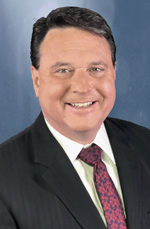As part of a coordinated multistate action, Indiana Attorney General Todd Rokita has stopped a massive telefunding operation that bombarded 67 million consumers nationally with 1.3 billion deceptive charitable fundraising calls – mostly illegal robocalls. More than 12 million of those calls were made to Hoosiers.
Associated Community Services (ACS) and related defendants have agreed to settle charges that they duped generous Americans into donating to charities that failed to provide the services they promised.
The defendants collected more than $110 million using their deceptive solicitations. Rokita was joined in this action by the Federal Trade Commission and 46 agencies from 38 states and the District of Columbia.
The complaint names ACS and its sister companies Central Processing Services and Community Services Appeal; their owners, Dick Cole, Bill Burland, Barbara Cole, and Amy Burland; and ACS senior managers Nikole Gilstorf, Tony Lia, John Lucidi, and Scot Stepek. In addition, the complaint names two fundraising companies allegedly operated by Gilstorf and Lia as spin-offs of ACS – Directele and The Dale Corporation.

Rokita
“When I ran for attorney general, I promised to protect the people of Indiana from deceptive practices and fraudulent scams,” Rokita said. “We are off to a strong start, and I am deeply grateful for the work of our team.”
Announcing the settlement during National Consumer Protection Week, Rokita pledged to continue his work to stop illegal robocalling.
“These kinds of deceptive, harassing phone calls are more than just a nuisance,” Rokita said. “They are crimes aimed at bilking unsuspecting victims out of their hard-earned money. We will do everything we can to bring perpetrators to justice.”
Collaboration between federal and state governments has been key to successful actions against fraudulent fundraisers, noted Daniel Kaufman, acting director of the FTC’s Bureau of Consumer Protection.
“Deceptive charitable fundraising can be big business for scammers, especially when they use illegal robocalls,” Kaufman said. “The FTC and our state partners are prepared to hold fraudsters accountable when they target generous consumers with lies.”
According to the complaint, the defendants knew the organizations for which they were fundraising spent little or no money on the charitable causes they claimed to support. In some cases, the defendants kept as much 90 cents of every dollar they solicited from donors.
The complaint alleges that the defendants made their deceptive pitches since at least 2008 on behalf of numerous organizations that claimed to support homeless veterans, victims of house fires, breast cancer patients, children with autism and other causes that well-meaning Americans were enticed to support through the defendants’ high-pressure tactics.
Attached are the complaint and terms of settlement in this case, which are pending court approval. Additional documents related to this matter are available upon request.
Consumers who have been targeted by scammers may file complaints with the Office of the Indiana Attorney General either online or by calling 1-800-382-5516.
